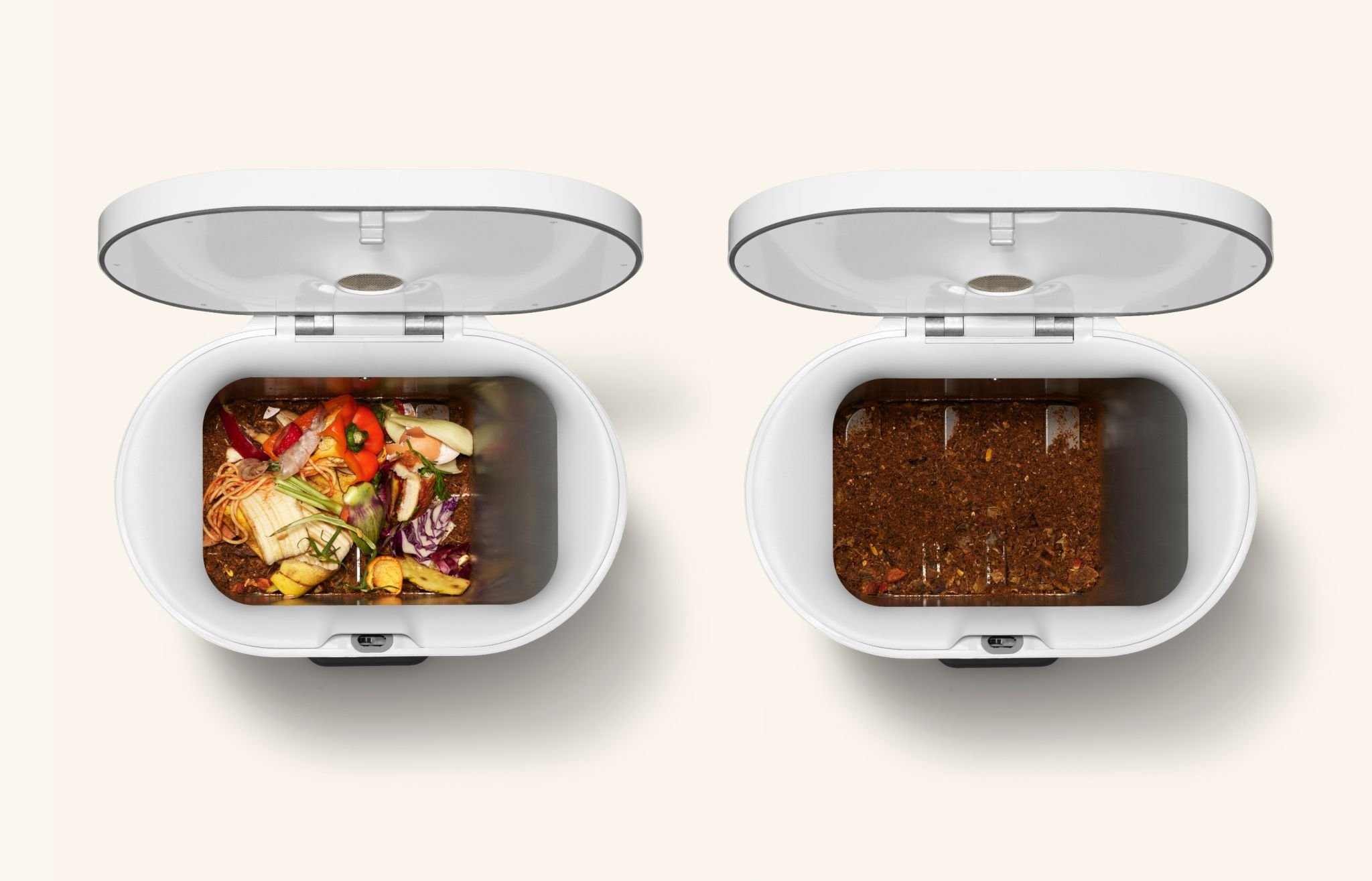Mill
Our Investment in Mill
Reducing emissions by keeping home food waste out of landfills
Most of us can empathize with the regular chore of discarding the food we can’t eat, and it’s fair to say that few enjoy managing the messy, malodorous remnants of our meals. Yet the typical consumer is often unaware of how much food waste is produced and its impact on the climate. In the U.S. alone, one statistic, in particular, is jaw-dropping: over a third of food produced is never eaten. According to the Environmental Protection Agency (EPA), this translates to over 39 million tons of food waste per year. And if left unsorted, food waste produced at home is destined for the landfill, where it constitutes 22% of the refuse. Once compacted into mounds, food waste degrades without oxygen and emits methane, which is twenty-five times more heat-trapping than carbon dioxide. According to the national nonprofit ReFed, households contribute 43% of all waste at landfills, representing the largest source of waste. In addition to the direct emissions attributable to food waste, there are the embedded emissions resulting from the production and transportation of food that ultimately goes uneaten. The EPA estimates that discarded food in the U.S. uses enough water and energy to supply more than 50 million homes.
Based in San Bruno, California, the new climate startup Mill is working to reduce emissions from food waste at home by keeping it out of landfills. Drawing from the design and product DNA of the Nest co-founder, the company has launched an innovative membership service that comes with a kitchen bin that dries, shrinks, and de-stinks kitchen scraps into Food Grounds which are dry, light, and shelf-stable. Instead of handling soppy and smelly compost bins, people are able to discard the food they can’t or don’t eat effortlessly into a streamlined, WiFi-connected receptacle. The accompanying Mill app tracks and measures users’ impact based on the usage of the kitchen bin. Moreover, Mill provides its users with prepaid boxes enabling them to ship back the resulting Food Grounds, which are sustainably used as feed for chickens. By avoiding the landfill, Mill is creating a circular economy that sustainably moves food — that might have gone to waste — from the home and back to the farm.
The Mill kitchen bin.
MCJ is incredibly proud to announce its investments in Mill, whose founders Matt Rogers and Harry Tannenbaum are experienced at building products that are good for people and the planet. Matt, the company’s CEO, was previously the co-founder of Nest, as well as an engineer on the early generations of the iPod and iPhone. Serving as Mill’s President, Harry worked with Matt at Nest, where he was the Head of Business Analytics and eCommerce. Prior to the launch of its venture funds, MCJ had the privilege of getting to know both Matt and Harry and started following their progress from Mill’s earliest days. Ever since, we have made several investments in Mill alongside fellow climate tech investors Breakthrough Energy Ventures, Lowercarbon Capital, Prelude Ventures, Energy Impact Partners, and John Doerr. We’re thrilled to share their story and vision for tackling climate change by enabling individuals to return food they might have wasted back into the food system instead of the landfill.
What is Mill?
After heating and dehydrating food waste, Food Grounds are left over.
Mill is reimagining the way in which people deal with the undesirable task of managing the food they can’t and don’t eat at home. Its unique membership service, including a new kind of kitchen bin, is designed to eliminate just about every unpleasant aspect of dealing with food waste at home. In addition, it provides the magical simplicity of a smart device and the peace of mind that comes from reducing one’s personal carbon emissions. Inside the 27-inch bin, metal paddles slowly churn uneaten or inedible food. Bad smells or fruit flies, unwelcome hallmarks of conventional compost bins, are absent from the Mill kitchen bin which uses cartridges of charcoal to prevent foul odor from developing. The bin heats food scraps until a resulting dirt-like mixture — what the company calls Food Grounds — remains. Users can then easily pour the Food Grounds into a prepaid box which the U.S. Postal Service will pick up from their house and ship back to Mill. The company turns the Food Grounds into an ingredient in animal feed that it provides to chicken farmers. Even accounting for the one kilowatt-hour of electricity used daily (comparable to an energy-efficient dishwasher) and emissions from transporting Food Grounds, Mill estimates that users can avoid more than half a ton of CO2 emissions just from landfill avoidance. Mill has published its life-cycle assessment, detailing the climate impact of a Mill Membership and the independent parties it worked with to validate its findings.
As part of the membership service, Mill provides an easy-to-use app that enables users to track and measure their emissions avoidance based on the waste converted into Food Grounds. The Mill membership is priced at $33/month on an annual basis and includes everything you need at home, like pre-paid shipping for the Food Grounds and replacements on charcoal filters.
Why did we invest?
Compelling Founder-Market Fit
One of the primary reasons we invested in Mill is because of Matt’s track record for building consumer products that enjoy mass adoption and benefit and delight users. Since the launch of the Nest Thermostat back in 2011, people around the world have installed it in their homes and offices. As a result of Nest’s success, many have credited it as having created the smart home category. With over 11 million devices sold since its inception, the company was able to convince homeowners to swap out their existing thermostat with the promise of energy savings and a seamless user experience. The accomplishments of Nest are a testament to its team’s vision and ability to execute. For this reason, back in 2020, we jumped at the opportunity to invest in Matt and Harry’s newest venture.
Some of the 100-person team employed by Mill.
In addition to building breakthrough products at Apple and Nest, Matt, along with his wife Swati Mylavarapu, is also the founder of Incite, an organization that backs startup entrepreneurs, nonprofit founders, and political leaders. Beyond Mill and Incite, Matt’s climate activity extends to board stints at a number of nonprofits, including Carbon180 and Activate.
During his time at Nest as Head of Business Analytics, Harry honed his ability as an operator, working cross-functionally to enable the company to drive decisions through data. When he took on eCommerce responsibilities at Nest, he focused on executing strategies that allowed the company to meet its revenue targets. Given their experience working together to build Nest into a leading brand, we could not be more confident and excited about this opportunity for them to take on a new challenge within the realm of climate change.
The success of Mill will hinge not only on its two founders, but also on its team. Matt and Harry have recruited a 100-person strong group of individuals whose backgrounds stem from Silicon Valley, government and policy, operations (e.g. Uber, Lyft), and the organics industry.
A Compelling Climate Value Proposition
The EPA estimates that, in the U.S., emissions from food loss and waste is equivalent to 42 coal-fired power plants (i.e. 170 million metric tons of CO2 equivalent emissions annually). With waste from homes contributing to nearly half that output, there’s a meaningful opportunity to reduce those emissions significantly. And while composting is a suitable solution for some, in order to achieve an impactful scale, many more homes will need to take up sustainably managing their food waste. To this end, Mill offers a way to convert greater numbers of people by making the experience more pleasant and motivating.
With growing fear and anxiety over the climate crisis, a zeitgeist has emerged in which more individuals are seeking ways to do their part to reduce their own carbon footprint. We strongly believe Matt and Harry can harness the expertise forged at Nest in developing a consumer experience that will radically transition people’s food waste toward a more sustainable path.





